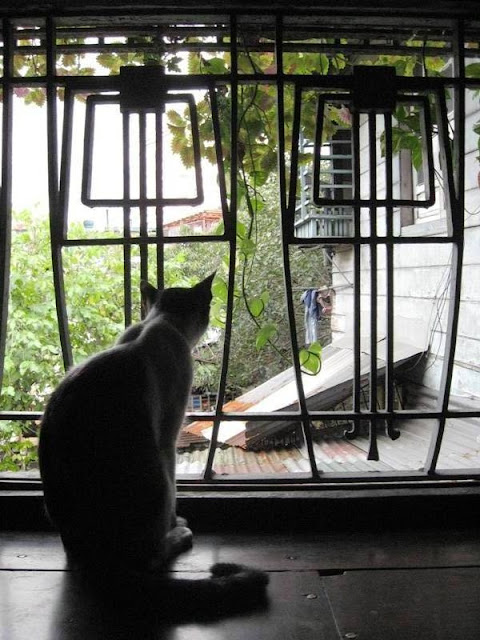More
commonly, cats are known as the picture of curiosity. What does a cat do with
all the information it gets from its curiosity?
Pinagninilayan? This is the
Filipino word for contemplation. But
this is only one of the 15 words that Filipinos use for the word contemplation.
Katkat Contemplating
According to Grace Odal-Devora these are the words
in Filipino synonymous with the word contemplation – nilay, himay, hinagap, hinuha, guni-guni, gunam-gunam,hulo,lining,
nuynuy,wari, muni,dili,limi,bulay and lirip.
Cats are some of the best teachers in nature when it comes to contemplation. They are second only to trees. Dogs, on the other hand--well let’s just say they can’t even spell the word. They’d be happy to eat it if you covered it with macaroni.
There’s a fine line between sleeping and contemplation for a cat. One key to knowing the difference is in the posture. Meditating has little to do with the eyes being open or closed. Usually if the feline’s underbelly is showing in any way, it’s not a meditative state.
One of the surest ways to tell when your cat
is contemplating the mysteries of life is whether or not they flinch when you
try to tip toe past them without disturbing them. In contemplation, the senses
are supposed to be sharp, perceptive. I read that zen masters would approach a
meditating student from behind with a flatboard. If the student didn’t duck
when he swung the paddle, he knew the student was catnapping--and the student
would be more cautious and alert the next time.
When cats contemplate, they actually aren’t
considering any external thing. They are looking inward. More answers to life
are found inside than they are on the outside. So you’ve got to be looking in
the right direction to have a chance to grow wiser.
Male cats have a tendency to stalk their
contemplative state while females wait and let the state come to them, which is
probably a much more effective way of doing it. It takes males much longer to
get to that point. And it usually happens after they stop seeing invisible gnomes
skating through the house that cause them to twist and hop around with wild
eyes.
Yet,
cats instinctively know the benefits
to contemplation and that’s why they
spend as much time doing it. Peace, maturity, confidence, ability to
appreciation the present moment even when there’s nothing to do.
Since
contemplation is not an instinctive thing for humans, we need to be taught to
follow prescribed steps
to enter a contemplative state. Not even cats can
meditate when there’s noise and activity going on, especially not when the
vacuum cleaner is going. You’ve got to find a quiet place where you’ll be
undisturbed for twenty minutes.
That’s
the advantage to being a cat. Cats have twenty minutes to
spare. It’s usually when the deities have left the house for the day. They
practice contemplating and sleeping all day. Then they walk all over you at
night, jumping on and off the bed, until 4:30 a.m. comes. Then they think they
are the alarm clock.
They might not do that if they understood
what this makes the deities contemplate doing to them.





